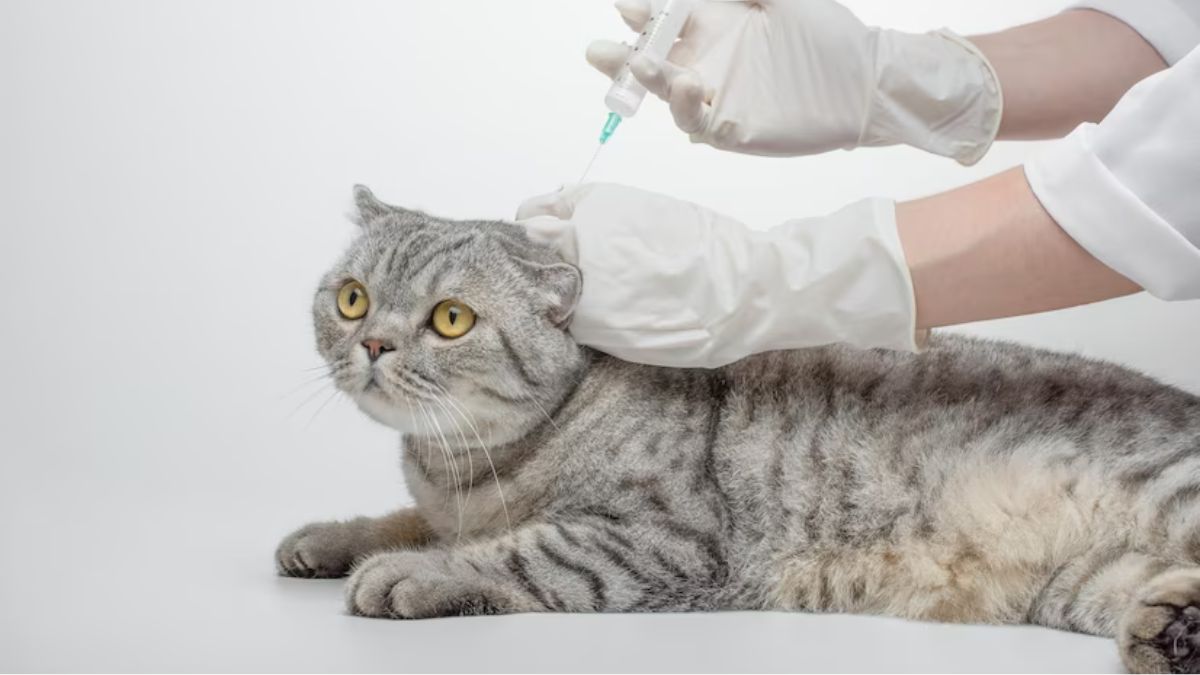Welcome cat lovers! If you’re a proud feline parent, then you know how important it is to keep your fur baby healthy and protected. One crucial aspect of their well-being is ensuring they receive the necessary vaccinations. Today, we’re here to debunk some common myths surrounding the FVRCP vaccine for cats. Whether you’re a seasoned pet owner or a new addition to the kitty club, this article will provide you with all the essential information about FVRCP vaccination that every responsible cat parent should know. So let’s dive right in and separate fact from fiction when it comes to protecting our precious whiskered companions!
What Is the FVRCP Cat Vaccine?
The FVRCP cat vaccine, also known as the “core vaccine,” is a crucial immunization that protects our feline friends from three highly contagious diseases: feline viral rhinotracheitis (FVR), calicivirus (C), and panleukopenia (P). Let’s break down what each of these diseases entails.
First up, Feline Viral Rhinotracheitis. This respiratory infection is caused by the herpesvirus type 1 and can lead to symptoms such as sneezing, nasal discharge, conjunctivitis, and even ulcers in the mouth. It’s highly contagious among cats and can spread through direct contact or sharing of contaminated objects.
Next on the list is Calicivirus. Similar to FVR, this virus affects a cat’s respiratory system but can also cause painful oral ulcers. Cats with calicivirus may experience fever, loss of appetite, lameness due to joint inflammation, and even pneumonia in severe cases.
We have Panleukopenia or feline distemper—an extremely serious disease that attacks a cat’s digestive system and bone marrow. Symptoms include vomiting, diarrhea (often bloody), lethargy due to low white blood cell count (hence the name panleukopenia), dehydration, and weight loss. Kittens are particularly vulnerable to this disease.
Now that you understand what the FVRCP vaccine protects against let me explain how it works its magic within your kitty’s immune system. The vaccine contains weakened or killed versions of these viruses which stimulate an immune response when introduced into your cat’s body.
By vaccinating your furry friend with FVRCP at appropriate intervals recommended by your veterinarian—usually starting at around eight weeks old—you’re providing them with essential protection against these potentially life-threatening illnesses. Remember that kittens require multiple doses spaced several weeks apart for optimal immunity building!
Stay tuned because next up we’ll dive into why the FVRCP vaccine is considered a core vaccine and what
Why Is the FVRCP Vaccine Considered a Core Vaccine for Cats?
The FVRCP vaccine is considered a core vaccine for cats because it provides essential protection against three highly contagious and potentially deadly feline diseases: feline viral rhinotracheitis (FVR), calicivirus (C), and panleukopenia (P). These are common infections that can spread rapidly among cats, especially in multi-cat households or environments where cats congregate.
FVR is caused by the feline herpesvirus and primarily affects the respiratory system. It can cause symptoms such as sneezing, nasal discharge, coughing, and fever. In severe cases, it can lead to pneumonia or eye problems. Calicivirus also affects the respiratory system but can also cause ulcers in the mouth and tongue. Panleukopenia is a highly contagious virus that attacks cells in the bone marrow, intestines, and other organs. It causes vomiting, diarrhea, dehydration, fever, anemia, and can be fatal.
By vaccinating your cat with the FVRCP vaccine regularly according to your veterinarian’s recommended schedule from kittenhood through adulthood helps ensure their immune system remains strong against these diseases. It not only protects your cat but also helps prevent them from spreading these viruses to other cats they come into contact with.
It’s important to note that even indoor-only cats should receive this vaccine since viruses like FVR or calicivirus can be transmitted through close contact with infected humans or objects such as clothing or shoes. Additionally, if you ever plan on bringing another cat into your household or boarding your cat at a facility that requires vaccinations proof of vaccination will likely be required before admission.
Receiving regular vaccinations throughout their lives helps maintain continuous immunity against these diseases as some vaccines may lose effectiveness over time. Your veterinarian will determine how often your cat should receive booster shots based on factors like age,
health status.
While side effects from receiving the FVRCP vaccine are generally rare mild reactions such as fever, lethargy, or local swelling at the injection site may occur
How Often Should My Cat Receive the FVRCP Vaccine?
How often should my cat receive the FVRCP vaccine? This is a common question that many cat owners have. The frequency of the FVRCP vaccine depends on several factors, including your cat’s age, lifestyle, and overall health.
Kittens typically receive their first dose of the FVRCP vaccine at around 6 to 8 weeks of age. They will then need additional booster shots every three to four weeks until they are about 16 weeks old. These early vaccinations are crucial in providing kittens with immunity against serious diseases such as feline viral rhinotracheitis, calicivirus, and panleukopenia.
Adult cats who have not been previously vaccinated or whose vaccination history is unknown will also require a series of initial doses followed by regular boosters. After completing the initial series, most adult cats will need a booster shot every one to three years to maintain their immunity.
However, it is important to note that some cats may require more frequent vaccinations based on their individual circumstances. For example, outdoor cats or those living in multi-cat households may be at higher risk for exposure to disease and therefore benefit from more frequent vaccination.
It’s also worth mentioning that certain circumstances or events may warrant additional vaccines outside of the typical schedule. For instance, if you plan on boarding your cat or taking them to a grooming salon where they could come into contact with other animals, it might be recommended to update their vaccines beforehand.
It’s best to consult with your veterinarian who can assess your cat’s specific needs and provide personalized recommendations for vaccination schedules based on various factors such as age, lifestyle habits and potential risks.
Remember that keeping up-to-date with vaccinations is an essential part of responsible pet ownership. By ensuring your furry friend receives the appropriate doses at the right intervals, you’re helping protect them from preventable diseases and promoting their overall well-being!
Does the FVRCP Have Any Side Effects?
One concern that many cat owners have when it comes to vaccinations is whether or not there are any side effects. After all, we want to ensure the health and well-being of our furry friends without causing them unnecessary discomfort. So, let’s address some common myths about the FVRCP vaccine and its possible side effects.
It’s important to note that the FVRCP vaccine is generally safe for cats. However, like with any medical treatment, there can be potential side effects. These are typically mild and short-lived, such as a slight fever or soreness at the injection site. It’s worth mentioning that serious reactions are extremely rare.
Some people worry that their cat may develop an illness from receiving the vaccine itself. This is another myth! The FVRCP vaccine contains inactivated viruses or proteins derived from those viruses. It cannot cause your cat to contract feline distemper (panleukopenia), calicivirus, or rhinotracheitis (herpesvirus).
Another myth surrounding vaccines in general is that they can weaken a cat’s immune system over time. Again, this is not true for the FVRCP vaccination! In fact, it actually helps strengthen your cat’s immune response against these potentially dangerous diseases.
There is also a misconception that indoor cats don’t need vaccinations because they aren’t exposed to other animals or environments where diseases could be present. While indoor cats may have lower exposure risks compared to outdoor cats, they can still come into contact with infectious agents brought in by humans or through open windows and doors.
Some pet owners worry about allergic reactions to vaccines but rest assured allergies are very rare when it comes to the FVRCP vaccination! If you notice any unusual symptoms following your cat’s vaccination(s), consult your veterinarian immediately for appropriate advice.
While every medical procedure carries some risk of side effects – even something as routine as a vaccination – rest assured that the FVRCP vaccine is considered safe for cats. The potential side
How Much Does the FVRCP Cat Vaccine Cost?
When it comes to keeping our beloved feline friends healthy, vaccinations play a crucial role. One of the core vaccines recommended for cats is the FVRCP vaccine. But how much does this important vaccination cost? Let’s debunk some common myths and get down to the nitty-gritty.
1. Myth: The FVRCP vaccine is expensive.
The truth is, getting your cat vaccinated doesn’t have to break the bank. While prices may vary depending on factors such as location and veterinary clinic, overall, the cost of the FVRCP vaccine is relatively affordable compared to other treatments or procedures.
2. Myth: I can skip vaccinating my cat because it’s too costly.
While there might be upfront costs involved in getting your cat vaccinated, consider it an investment in their long-term health and well-being. Vaccinations help prevent serious illnesses that can be life-threatening or require expensive treatments later on.
3. Myth: There are no low-cost options available for FVRCP vaccinations.
Actually, many animal shelters and nonprofit organizations offer low-cost or even free vaccination clinics for cats in need. So if you’re concerned about affordability, do some research and see what resources are available in your area.
4. Myth: The price of the FVRCP vaccine includes additional fees.
While some veterinary clinics may charge additional fees for administering vaccines or providing a comprehensive wellness exam along with it, not all do. It’s worth checking with different clinics to find one that offers transparent pricing without any hidden charges.
5. Myth: All veterinary clinics have similar prices for the FVRCP vaccine.
Just like any other service or product you purchase, prices can vary from one place to another when it comes to pet vaccinations as well. Don’t hesitate to shop around and compare prices before making a decision – after all; we want what’s best for our furry companions!
In conclusion… Oops! Sorry about that! We’ll leave conclusions for the final section. Stay tuned to learn more about scheduling an appointment for your
Schedule an Appointment for Your Cat’s Vaccinations
Keeping your cat healthy and protected from diseases is a top priority for every pet owner. One of the most important steps you can take to ensure their well-being is to schedule regular vaccinations, including the FVRCP vaccine. By staying up-to-date with your cat’s immunizations, you are providing them with the best possible defense against potentially deadly illnesses.
When it comes to scheduling appointments for your cat’s vaccinations, it’s crucial to follow the recommended guidelines provided by your veterinarian. Typically, kittens should receive their first round of FVRCP vaccines at 6-8 weeks old, followed by boosters every 3-4 weeks until they reach 16 weeks of age. Adult cats should receive a booster shot annually to maintain immunity.
Scheduling an appointment for your cat’s vaccinations doesn’t have to be a daunting task. Simply contact your veterinarian and let them know that you would like to schedule a visit specifically for vaccination purposes. They will guide you through the process and provide any necessary information or instructions beforehand.
During the appointment, your veterinarian will assess your cat’s overall health and administer the necessary vaccines, including FVRCP. It’s important to note that some veterinarians may recommend additional vaccines based on factors such as lifestyle or geographic location.
Don’t forget about annual wellness check-ups! These visits allow veterinarians not only to update vaccinations but also perform thorough examinations and screenings that can detect potential health issues early on.
Remember that consistency is key when it comes to protecting your furry friend from preventable diseases. By staying diligent with scheduling appointments for vaccinations, you are taking proactive steps towards ensuring a long and healthy life for your beloved feline companion.
Keep in mind that every cat is unique, so it’s essential to consult with your trusted veterinarian regarding specific vaccination recommendations tailored specifically for their needs. Together, you can create a personalized vaccination plan that meets all requirements while keeping your furry friend safe and healthy!
Conclusion
Debunking the myths surrounding the FVRCP vaccine is essential for cat owners to make informed decisions about their pet’s health. The FVRCP vaccine is a crucial core vaccination that helps protect cats from several potentially deadly diseases, such as feline viral rhinotracheitis, calicivirus, and panleukopenia.
Contrary to popular belief, it is not necessary to administer the FVRCP vaccine every year. Current guidelines suggest that adult cats receive booster shots every three years or even less frequently in low-risk environments. It’s important to consult with your veterinarian to determine the best vaccination schedule for your furry friend.
While some mild side effects may occur after vaccination, they are usually temporary and far outweighed by the benefits of immunization. Serious adverse reactions are rare and typically associated with pre-existing conditions or allergic reactions.
The cost of the FVRCP cat vaccine can vary depending on various factors such as location and veterinary clinic fees. However, considering its effectiveness in protecting your cat against potentially life-threatening diseases, investing in this essential preventive measure is undoubtedly worth it.
Remember that vaccinating your cat should be part of a comprehensive wellness plan that includes regular check-ups and a healthy diet. By following these guidelines and staying up-to-date with vaccinations like FVRCP, you can provide your furry companion with a long and happy life free from preventable diseases.
Schedule an appointment with your veterinarian today to discuss your cat’s specific needs for vaccinations like FVRCP. Protecting their well-being starts with taking proactive measures towards their health!
By busting these common misconceptions about the FVRCP vaccine, we hope to empower cat owners like you to make informed decisions regarding their beloved pets’ healthcare needs. Stay educated, stay proactive – together we can keep our feline friends healthy and thriving.
ALSO READ: Cat Food the Ultimate Guide: Nourishing Your Feline Friend











